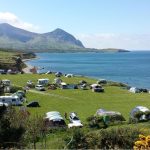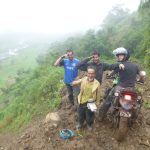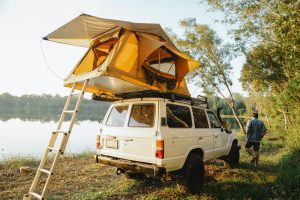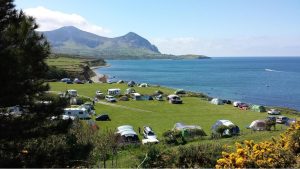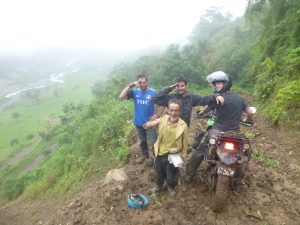The fast-paced routine of modern life can grind you into a melancholic paste.
Never-ending work deadlines, pointless meetings, overflowing inboxes, constant traffic, political tension, lack of personal time, and disconnect from family and friends can wear anyone down.
Add to that health, financial, and relationship troubles, and you have a recipe for a downward spiral.
Change is needed.
Some people downplay the modern-day struggle. Admittedly, we aren’t battling saber tooth tigers or dying from minor infections.
But we still live in a jungle. A cold, mechanical jungle
Depression, anxiety, stress, and fatigue easily creep in and become unwanted companions.
The blur of modern life must be refocused with a reconnection to the world, Nature, humanity, and yourself.
Here’s a way to do it…
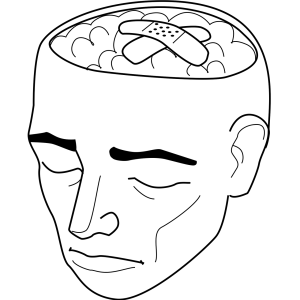
Breaking the Cycle
Ideally, we are covering our Hierarchy of Needs and working to live a healthier lifestyle, including mental health counselling, if needed. While this won’t guarantee happiness, it provides a better foundation to find contentment.
In the short term, we need to Break the Cycle of our unrelenting routine.
Routines have their place, but sometimes they need to be intentionally disrupted. This can be done with a change of scenery, new challenges, space to think, or reconnecting with loved ones.
We want to be clear: This is not an advocation for running from your troubles.
Burying your head in the sand may give you a different view but the problems will only grow. You must confront your woes at some point, but that may require stepping back to get a better view.
Breaking the Cycle enables you to connect by disconnecting. Getting off the hamster wheel allows you to make progress in other directions.
There’s no one way to Break the Cycle, but we have two suggestions that are at the core of our company, Outdoor Roadie:
-
Travel
-
Nature
The exciting part is that Travel and Nature are easily intertwined and are inherently connected. Even at the most superficial level, you must travel to Nature if you live in a city. Going for a hike is Traveling in Nature.
The overlap makes Breaking the Cycle much more accessible, and the combinations are endless.
In brief, Nature & Travel Break the Cycle by Giving You:
- Time to Think
- Challenges
- Connection
- Change of Scenery
- Learning Opportunities
Let’s Explore How:

Time to Think
- The rapid grind of life leaves little time to think and reflect. You’re fighting to keep your head above water each day before collapsing into bed, only to repeat it the next day.
- The saying, “You can’t see the forest for the trees,” becomes ever applicable. It isn’t easy to see the bigger picture when you’re only able to see what’s right in front of you.
- So, how can you be sure that the direction you’re heading is the right one? Have you created space and time to consider these choices?
- Nature and Travel both allow time to think. They remove your daily blur of consumption and replace it with new stimuli and, more importantly, time to think about life.
- Clarity and inspiration will hit you from all angles because you created space for those ideas to enter your consciousness. The typical jittery barrage of day-to-day life is absent, which allows creativity to flourish.
Challenges
- Challenges are learning moments. A new challenge can lead you to unseen perspectives, spark confidence, and accelerate you in a new direction. Plus, it’s difficult to wallow in melancholy when learning a new skill or embarking on a harrowing quest.
- Travel and Nature create unique circumstances for challenges. Completing an arduous trek through the mountains or navigating a foreign country requires dedication and ongoing problem-solving.
- The problem-solving and overcoming obstacles are half the fun. It’s where the growth is happening. That said, start slowly on your challenges. Your skills and confidence need time to grow.
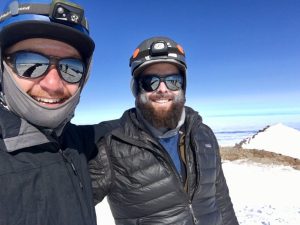
Connection
- The disconnect of modern society is rife.
- Ironically, the immediate gratification, access to endless information, and ability to instantly communicate with the world have made us less connected than ever before.
- Our lives are continually compartmentalised into isolation, work, and busyness. We operate within concrete and brick jungles, further disconnecting from the majesty of Nature. Ultimately losing touch with ourselves and our loved ones.
- Relationships of all kinds suffer when we are unable to spend quality time with our counterparts. So, change that. Create treasured memories by taking your loved ones into nature.
- But it’s not just family and friends we need to reconnect with. We also need to connect with ourselves. At the risk of sounding woo-woo, take a step back from who you think you’re supposed to be and just be. Be present and enjoy what’s around you.
- Lastly, we need to connect with Nature.
- Despite our modern proclivities, we came from Nature and are part of Nature. Getting back into Nature is a form of going home and connecting.
- Studies have shown that walking in Nature is better at reducing anger, sadness, stress, and general depressive symptoms than walking in a city.
- Additionally, Forest Bathing, also known as Shinrin-Yoku, is a Japanese practice of mindfully walking through the forest. Research reveals improvements in mental and physical health, including lower blood pressure, depression, inflammation, and anxiety.
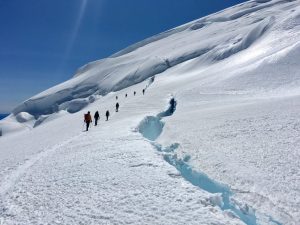
Change of Scenery
- The treadmill of modern life is excellent for increasing your heart rate and making you feel like you’re going the speed of sound without actually going anywhere. It’s a trap. The treadmill’s speed keeps increasing, your heart rate keeps going up, and you still aren’t seeing or doing anything new.
- Preserving your sanity requires you to hit the stop button and get off the treadmill. It can be a quick afternoon excursion to the forest, a week long trek through the Himalayas, or a romantic weekend in Paris. The key is to get off the treadmill and see something new or different.
- A 2020 study showed new and diverse experiences are linked to improvements in well-being and happiness. What better way to access diverse backgrounds than by changing your scenery. Nature and Travel are automatic alterations to your usual views. And it’s not until you change those views do you realize how badly you need that change of scenery.
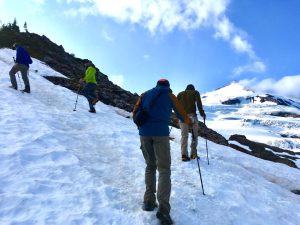
Learning Opportunities
- Study after study has shown the health benefits of learning.
- This study showed that cognitive training improved mental skills across all ages and genders. Another study showed that executives who read for six minutes a day reduced their stress by 68%. Studies show that continuing education positively affects many health outcomes and psychosocial qualities such as self-esteem and a sense of purpose.
- It makes sense. When you learn, you are bettering yourself. That ripple effect transcends you, positively impacts those around you, and alters your life path in some way. It is a robust process that compounds over time.
- Travel and Nature offer endless learning opportunities for those willing to receive the lessons. Fascinating locals, unique foods, dramatic views, history, biology, outdoor skills, and anthropology are just the tip of the iceberg. More importantly, it’s an opportunity to learn about yourself. How you react in different environments, why you think the way you do, and how you process adversity and triumphs. Travel and Nature have a knack for teaching lessons you didn’t know you needed.
Breaking the Cycle isn’t complicated.
But it takes intention and a willingness to get off the couch and make it happen.
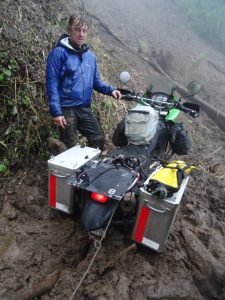
The Downside to Travel & Nature
Before gallivanting to distant lands, remove the rose-colored glasses.
Everything has upsides and downsides – Travel and Nature are no different.
These drawbacks are not meant to dissuade – For they can be the very challenges you need.
Think of it in terms of Type 1 vs Type 2 Fun.
- Type 1 is fun, immediate gratification.
- Type 2 entails a struggle in the moment but is more impactful and memorable in hindsight.
How much Type 2 Fun do you engage in?
Perhaps you need more.
____________________________________________________________________
Here’s a Short List of Downsides
&
How to Handle Them:
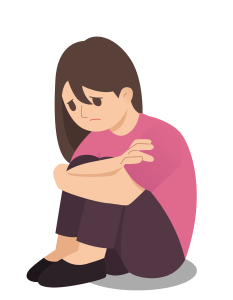
Loneliness
- For some, solitude is equated to loneliness. Too much isolation can undoubtedly contribute to loneliness. Yet you can be surrounded by people all day and still feel lonely.
- Occasional loneliness is expected when traveling or out in Nature. This is especially true early on in your journey after the initial honeymoon phase is over. Unknown terrain, unfamiliar faces, language barriers, and the magnitude of distance will amplify feelings of being a world away.
- Despite the relative solitude of traveling and the outdoors, you will encounter exciting characters that made similar choices to you and ultimately your paths crossed. You may have a pleasant exchange and go on your way. Other times you may hit it off and become lifelong friends.
- But you’ll never meet those people if you worry at home.
How to Handle It:
- If you have a signal or WiFi, call family and friends. It’s that simple.
- But once you’ve expressed your love for them, it’s time to enjoy what you came for. Go meet other travelers, take classes, go on walking tours, or soak in the majesty of your natural surroundings.
- You will have moments of missing your family and friends. You will struggle to communicate with someone who doesn’t speak your language. These moments may make you question your decisions. This is normal.
- However, your anguish will be short-lived. New sights, enticing smells, and fascinating people are potent forces for the mind.
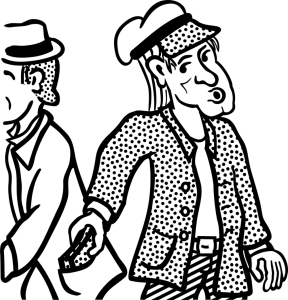
Exposure to Danger, Theft, Robbery, or Scams
- Are there risks and dangers to venturing outdoors or traveling to faraway countries? Of course.
- But is that risk bigger than what you currently face at home? Is the risk more significant than your daily commute? They’re certainly less risky than the long-term health risks of an unhappy, sedentary lifestyle. There is risk in everything, including doing nothing.
- The reality is that unless you are pushing the limit (ex., Mountaineering, traveling to war-torn regions, base jumping), you are likely safer than crossing the street in your own city.
- The likelihood of something bad actually happening is small. And if something does happen, it’s likely surmountable. Pick-pocketed at a foreign market? Lost your passport on the subway? Is your tent leaking in a rainstorm? Guess what? All solvable problems which will be a story later.
How to Handle It:
- There are many ways to go about this. However, Tim Ferriss offers an insightful practice called Fear Setting that is straightforward and actionable.
- The short of it entails thinking in great detail about possible worst-case scenarios, how you could mitigate them, what could happen, and what is likely to happen.
- The likely outcome is that your worst fears are unlikely to happen and surmountable if they do.
Don’t Let Fear of Hypotheticals Stop You
“There is nothing so wretched or foolish as to anticipate misfortunes. What madness it is in expecting evil before it arrives!” – Seneca
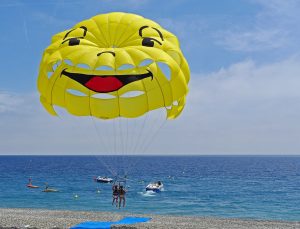
Time to Get Started
It’s best to start with small, low-friction adventures. An afternoon hike, a night in the woods, or a short getaway to a new country.
The key is finding something you want to do, setting a date, and going. Don’t over plan it. Cover your bases but leave space for serendipity to enter.
Each foray into Nature or abroad will build your confidence and help refine your skills. You can read every travel or survival guide but you won’t know it until you do it.
So, put yourself out there. You won’t have all the answers, you will make some mistakes, and it often won’t be as cosy as your couch. However, the personal enrichment and nourishing effects on the mind and body cannot be ignored.
Break the Cycle before it breaks you.

Medical disclaimer:
We are not medical professionals nor do we play them on TV. This is not meant to replace your health treatment plans. Consult your physician.
*This article was originally written for Outdoor Roadie, a UK-based retailer.



